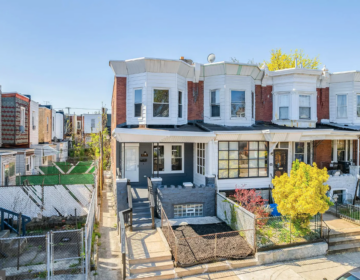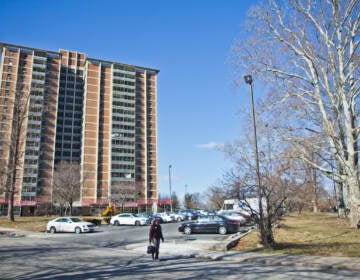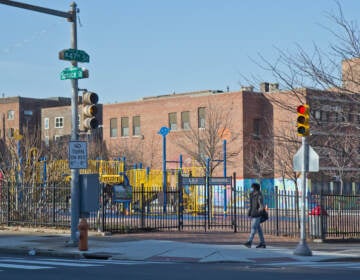This entrepreneur wants to bring the 21st century economy to 52nd Street
Philadelphia entrepreneur Tayyib Smith is teaming up with developer Guy Laren of Constellar Corp. to build a business hub designed for social impact.
Listen 1:49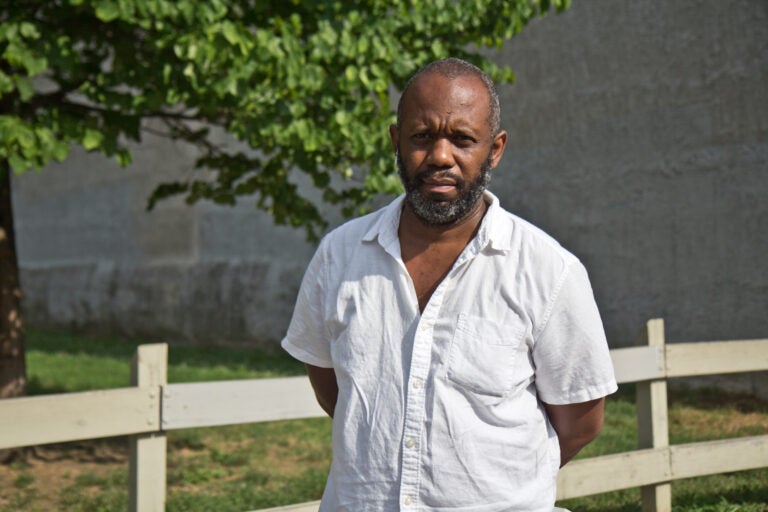
Tayyib Smith is planning to build an entrepreneurship hub on 52nd Street near Arch Street in West Philadelphia. (Kimberly Paynter/WHYY)
Serial entrepreneur Tayyib Smith remembers seeing Jesse Jackson, Barack Obama, and a dead body all on 52nd Street in West Philadelphia — not all at the same time, of course.
“I remember when Jesse Jackson came to 52nd and Market to campaign, and I remember in 2007 or 2008 when Barack Obama came to 52nd and Spruce,” he recalled. “And I also remember when I was like 13 coming home from a party, actually in the suburbs, getting off the El and seeing, the first time, I saw a dead body — another young Black man, at 52nd and Sansom.”
Over the ensuing years, these early memories and experiences — emblematic of both the significance and struggles of the historic business corridor — shaped Smith’s approach to business, says the 49-year-old co-founder of Pipeline, a co-working space in Center City. Creating opportunities for others became part of his mission.
“Being fortunate enough to punch above my weight class, across sectors, I feel almost obligated to create an environment where other people can share those experiences,” Smith said. “Where better to do it than the community that embraced me when I was a kid?”
A third-generation Philadelphian with a background in media and the music industry, Smith is now returning to 52nd Street with a vision for realizing that mission.
With a team that includes developer Guy Laren of Constellar Corporation and his own real estate company, S&R Holdings, Smith wants to transform a vacant lot on 52nd Street just north of the Market Street El station into a five-story, 27,000 square-feet entrepreneurship hub.
The new building would be a place for commercial, business, and co-working spaces designed to benefit the surrounding West Philadelphia community, says Smith. The partners have already secured one tenant, Women’s Opportunities Resource Center, or WORC, a nonprofit that will provide microloans for small businesses in the area.
“As long as they’re up there doing the work, we’re happy to support them,” said Lynne Cutler, president of WORC. “[Smith] seems to understand the business needs.”
About 3,000 to 4,000 square feet will be dedicated to IF Labs, another one of Smith’s ventures. The lab is a co-working space that seeks to connect startup businesses in underserved communities with resources — and each other. The lab currently operates in Kensington. The 52nd Street IF Lab would provide West Philly entrepreneurs a reason to stay in their own neighborhood and contribute to the local economy there, instead of going to Center City, Smith says.
Smith and Laren say they want the entrepreneurship hub to contribute to the revitalization of the storied Black business corridor after decades of disinvestment and the months-long coronavirus shutdown, which was almost immediately followed by a weekend of uprisings in the city that brought police violence and destruction to the strip.
Like Smith, Laren comes to the 53-59 52nd Street project with experience in the neighborhood. He founded Constellar in 1982 in West Philadelphia, and while he has since expanded to other neighborhoods in the city, University City and the gentrifying areas around it remain a stronghold for the company with thousands of units of housing and commercial space developed in the area over the decades.
The 52nd Street project doesn’t look like any other project in the Constellar profile. Laren says that he and Smith began planning the project about two years ago. The project feels even more urgent today, he said.
“The relevance [of the project] grew with the pandemic and the riots,” said Laren. “Tayyib and I both believe that that corridor will experience a resurgence because it’s such an important shopping district for the Black community there.“

Building a ‘21st century economy’ on 52nd Street
Tempest Carter directs community and economic development work at Achievability, a nonprofit that focuses on reducing poverty and also acts as a registered community organization, or RCO, for 52nd Street, officiating community engagement for zoning matters in the area, among other things.
The recent events on 52nd Street brought “a flood of support and resources” to the area, Carter said. But access to capital and increasing real estate costs remain hurdles for business proprietors of color, who make up most of the owners on the corridor.
“There is still a large deficit in hard skills and the ability to navigate the capital process to really be able to build businesses,” said Carter.
While Smith and Laren hope their project can help bridge that gap, new projects in the area tend to draw suspicion of gentrification among residents. The entrepreneurship hub, with its $6 million price tag, is no different.
“The problem comes [when] you have new developers come in, and they can’t give any explanation how their project is going to directly benefit the community, and proactively fight against the community, from residential to commercial, being displaced,” said Jalil Bishop, who moved, with his wife, to the 52nd Street neighborhood a year and half ago and attended an RCO meeting about the project last week.
Laren responds to Bishop and other critics by pointing out that the land where they want to build is an empty lot, so the new building will add to the environment without directly displacing anything.
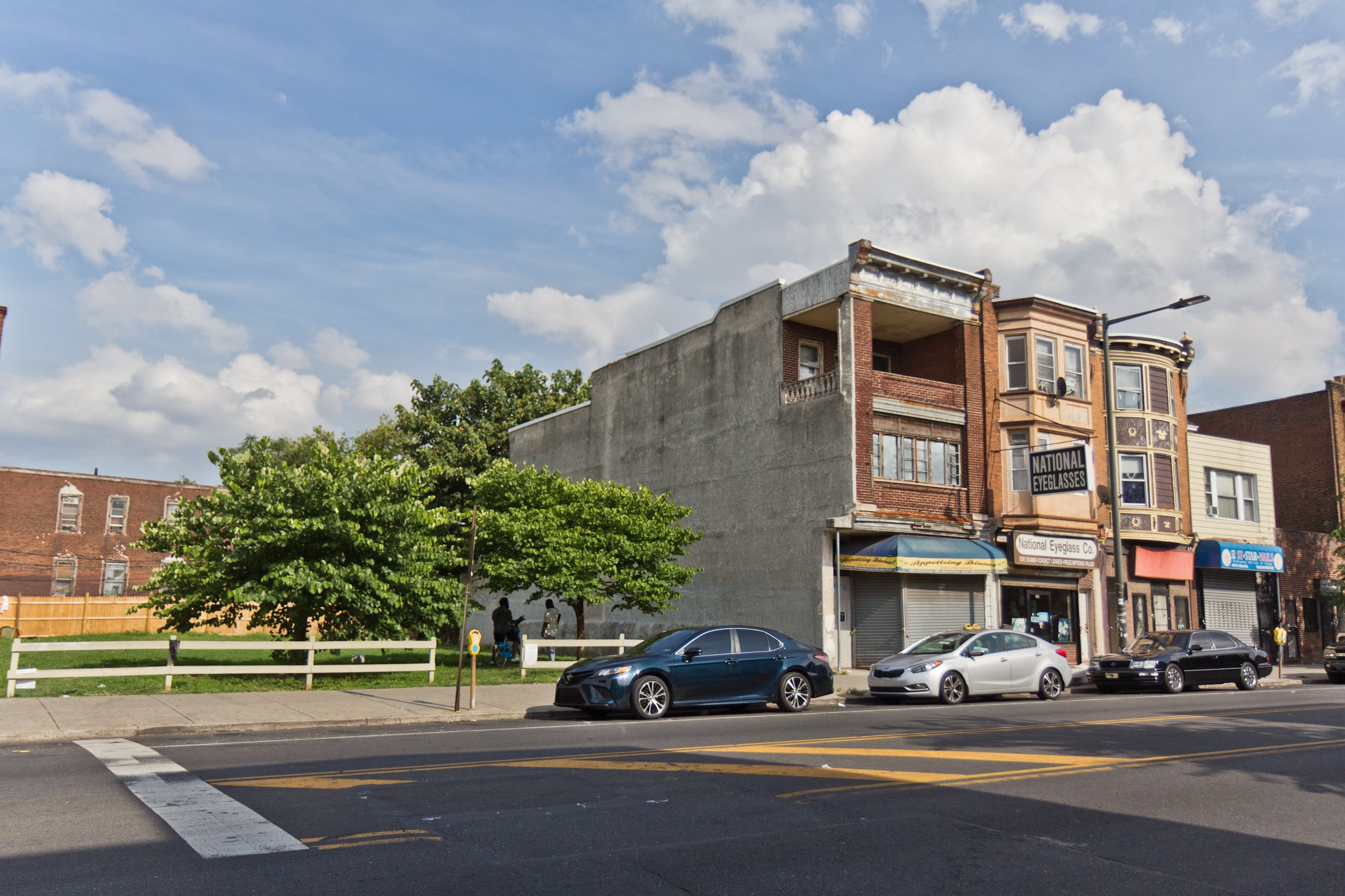
The developer said he and Smith are bringing a “wonderful impactful project” to the community at a time when it is difficult “to get anything financed and built in that area because of the riots.”
“I am taking a piece of property and I am going to contribute it to a partnership with a neighborhood African American entrepreneur,” added Laren. “We’re going to put our names on a substantially sized multimillion dollar construction loan and a permit loan. And we’re going to take a chance on bringing neighborhood people and neighborhood programs in there to enhance the community. And I can’t think of a more positive project for that area, where CNN had their cameras in the center of the looting and the rioting.”
Smith and Laren sought permission from community members at the Achievability RCO meeting to add one more floor than the city permits, and to add a courtyard instead of a traditional rear yard. But the conversation, held virtually, veered from the technical into the bigger picture — testing Smith’s connections with a community impatient to see Black people benefit as the area continues to become wealthier and more white people move in.
Some in attendance raised concerns about Smith’s partnership with Laren, who will be the landlord. Bishop mentioned the racial dynamics of the partnership between Smith, who is Black, and Laren, who is white, which can act as a smokescreen to addressing neighborhood concerns. Others called out the developers’ relationship with George Bochetto, a lawyer who has represented him and also represented the Frank L. Rizzo Monument Committee in a lawsuit against the city about the removal of the statue.
Others at the virtual meeting claiming to be Constellar tenants raised concerns about the company’s treatment of tenants.They spoke about the company ignoring or being slow to respond to “unsafe plumbing and electrical problems,” and failing to help tenants unable to pay rent due to the pandemic.
“I think we’re pretty good about helping any tenant that has any problem,” Laren said in his defense. “I hope this brand-new building won’t have any of those issues.”
At the time of this report, Achievability was still calculating votes, but of the 37 votes tallied on the night of the meeting 68% showed support for the project, though 27% of voters wanted changes.
If all goes according to plan, Smith and Laren plan to complete the building by the end of 2021. They can still build without the RCO’s support, but may have trouble getting the city’s Zoning Board of Adjustment to approve the variances they want for the extra floor and rear courtyard.
In the days after the meeting, Smith says he understands why some “have mistrust” and “justified anger.” As for specific concerns, he simply says he is willing to work with people. But both Smith and Laren question the integrity of the negative feedback directed at Constellar.
While standing on the lot at 52nd Street, Smith voiced his frustrations about some of the pushback.
“When I get off the El, the number of African American men who are 16 to 25 doing $2 swipes, that… breaks my fucking heart,” said Smith.
For him, that painful image connects back to the absence of opportunities for people in the neighborhood.
“This is Trap, U.S.A. Anywhere where there is a density of Black people, you got a dollar store, a bunch of hair stores … multiple Jamaican restaurants, multiple bodegas,” Smith said. “But we don’t have anything that represents the 21st century economy.”

Subscribe to PlanPhilly
WHYY is your source for fact-based, in-depth journalism and information. As a nonprofit organization, we rely on financial support from readers like you. Please give today.




